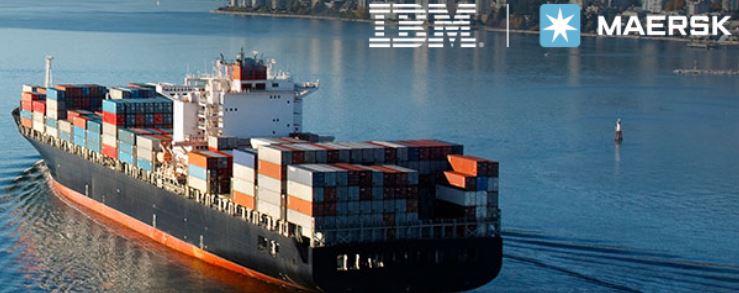Blockchain
TradeLens: How IBM and Maersk Are Sharing Blockchain to Build a Global Trade Platform
November 27, 2018 | Written by: Todd Scott
Categorized: Blockchain
Share this post:
 When IBM and global shipping leader Maersk announced in January 2018 an initiative to create a new global trade platform built on blockchain, the goals were at once simple yet ambitious: to reduce the cost of global shipping, improve visibility across supply chains and eliminate inefficiencies stemming from paper-based processes. In short, to bring global supply chains into the 21st century by digitizing them.
When IBM and global shipping leader Maersk announced in January 2018 an initiative to create a new global trade platform built on blockchain, the goals were at once simple yet ambitious: to reduce the cost of global shipping, improve visibility across supply chains and eliminate inefficiencies stemming from paper-based processes. In short, to bring global supply chains into the 21st century by digitizing them.
In the months since, we’ve made tremendous strides in building and scaling the solution – building it from scratch on blockchain technology and making it open to all. TradeLens is grounded in open standards with input from numerous stakeholders across the global supply chain. It is a modern solution that delivers significant value to all participants across the ecosystem.
It’s because of these attributes that TradeLens is off to a strong start and on track to achieve a critical mass of activity required for success. The solution has on-boarded or is in the process of on-boarding more than 100 organizations, including four ocean carriers, three inland carriers, more than 40 worldwide ports and terminals, large freight forwarders, and eight customs authorities spanning the globe from Rotterdam to Bahrain.
The companies that rely on global shipping lines to transport their goods, beneficial cargo owners (BCOs), have also embraced the platform with companies including Dow Chemical, DuPont, Tetra Pak and more participating or having agreed to do so. Members actively contribute data to the platform, and are connecting through open, non-proprietary TradeLens APIs that are freely available to the industry. TradeLens has already logged more than 230 million shipping events and is set to process more than 20 million containers before the end of 2018.
New participants are onboarding to TradeLens because they are eager to take advantage of benefits such as reduced paperwork, more efficient processes, and improved trust and transparency with trading partners. By digitizing supply chains, trading partners can collaborate seamlessly through a unified, shared view of transaction data secured by state-of-the-art encryption. Data on the network is confidential and each participant in TradeLens owns its data even after it resides on the blockchain, meaning they are the only ones that can grant access for others to see it.
The emergence of complementary networks, such as the blockchain platform recently announced by the GSBN consortium, underscores that the TradeLens bet was the right one and that this technology is gaining momentum in the global supply chain. A rising tide lifts all ships, and we have designed TradeLens so that as the ecosystem grows, the TradeLens value proposition grows in tandem. IBM and Maersk welcome new entrants into this nascent field and look forward to developing open standards together.
Still, more work remains to be done. The use of blockchain for global shipping isn’t just a new solution — it is a wholesale reimagining of the industry. For it to be successful in the long run, the network must continue to grow, the technology must continue to improve, and more value must be created for all participants.
This is about more than building new technology. The most important aspect of a platform like TradeLens is the construction of an ecosystem – building trust, in some cases, among competitors, to enable rivals to collaborate with one another through a model that benefits everyone. It’s about supporting open standards that help enable common data structures to enable more participants to join and collaborate. This cooperation is the crux of any successful blockchain network.
As IBM and Maersk continue to invest and build the world’s first blockchain network for the global supply chain, our value proposition will only continue to grow and attract more participants.

Blockchain Vice President, Global Trade IBM Industry Platform
Making the workplace safe for employees living with HIV
The recent promising news about Covid-19 vaccines is in sharp contrast to the absence of a vaccine for HIV, despite decades of research. Unlike Covid-19 with a single viral isolate that shows minimal diversity, HIV circulates in a wide range of strains that so far have proven impervious to a single vaccine. Fortunately, more people […]
Call for Code for Racial Justice Needs You: Join the Movement
IBM has never avoided taking on big challenges. At IBM, we are privileged to drive impact at scale. We take on challenges that transform our clients, impact people’s lives and innovate for future generations as we strive to effect systematic societal change. Over the course of our 109-year history, the evidence has become clear that […]
A New Wave: Transforming Our Understanding of Ocean Health
Humans have been plying the seas throughout history. But it wasn’t until the late 19th century that we began to truly study the ocean itself. An expedition in 1872 to 1876, by the Challenger, a converted Royal Navy gunship, traveled nearly 70,000 nautical miles and catalogued over 4,000 previously unknown species, building the foundations for modern […]





























